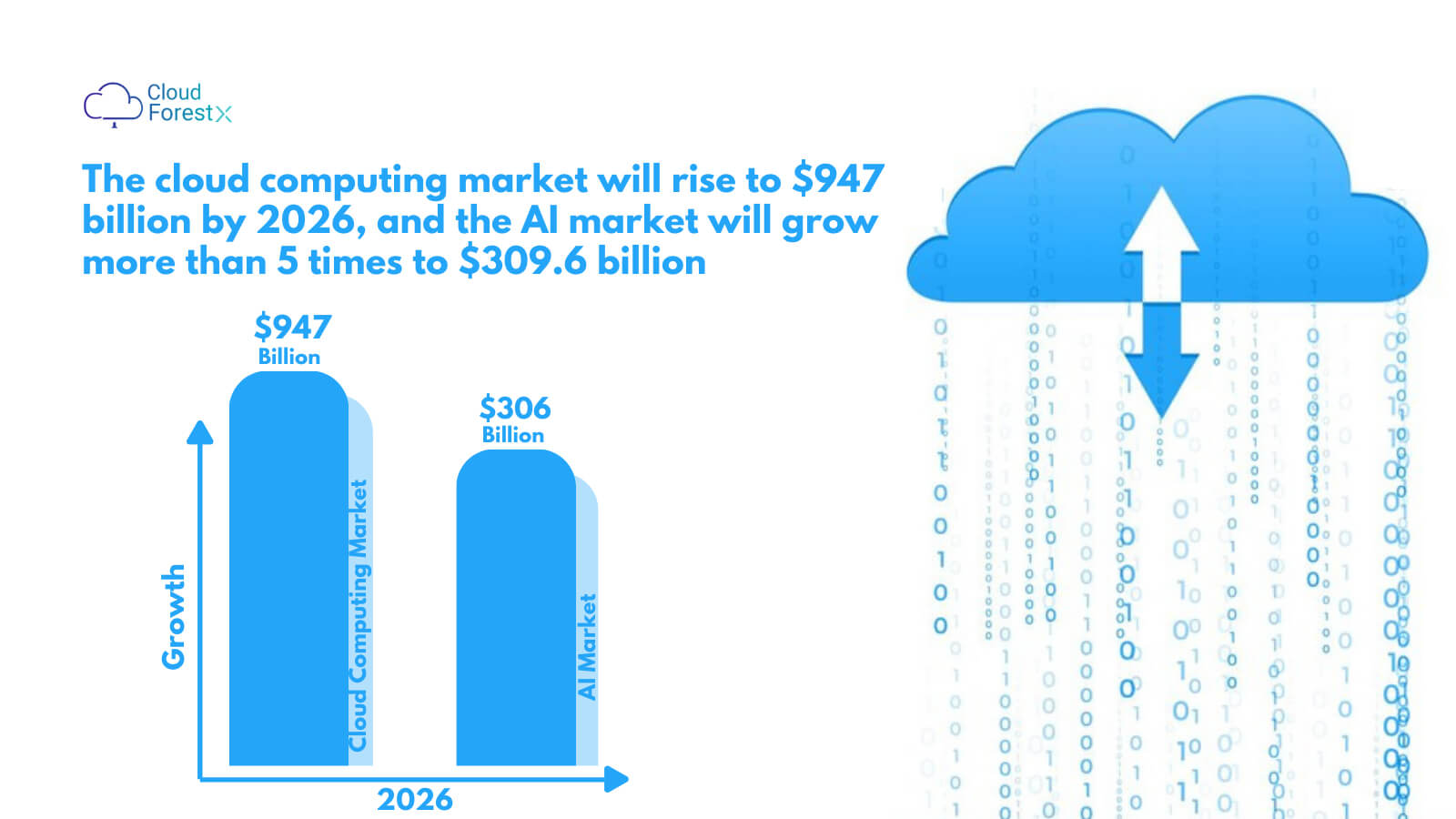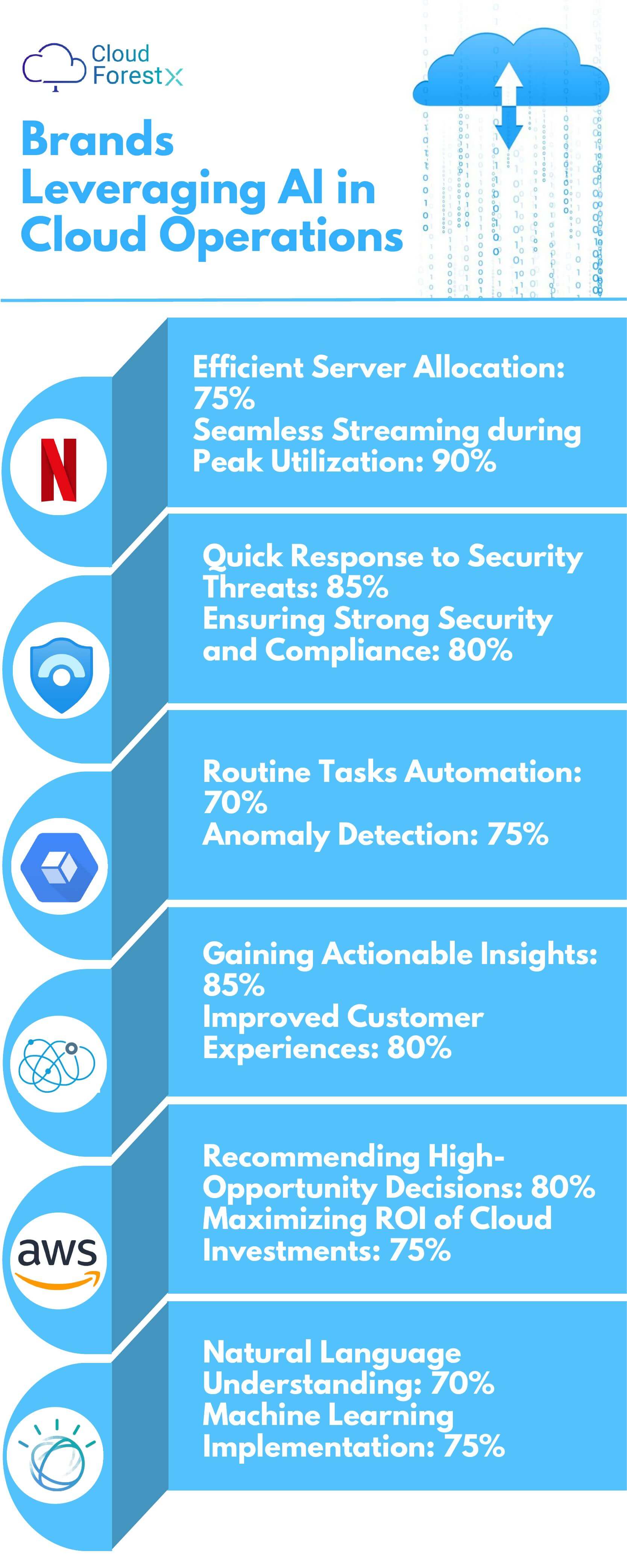The Role of Artificial Intelligence and Machine Learning in Cloud Services
AI and cloud computing are two important technological developments. Both technologies have changed the way we live and work, and the combination has given us a wealth of power and practical benefits.

AI and cloud computing are two important technological developments. Both technologies have changed the way we live and work, and the combination has given us a wealth of power and practical benefits. While the cloud computing market will rise to $947 billion by 2026, the AI market will grow more than 5 times to $309.6 billion.
But instead of viewing them as two competing markets, business leaders should strive to understand how the rapidly expanding field of AI can merge with cloud computing technology to deliver ever-growing innovation. This comprehensive article explores the multifaceted role of AI and ML in the cloud industry and its significant impact on business.
In the next section, we will discuss what is AI cloud computing, its benefits, and a few good examples of AI usage in cloud computing services across top leading brands.
What is AI cloud computing?
AI cloud computing is a concept that many companies have implemented, combining artificial intelligence and cloud computing. Hybrid cloud infrastructure can combine AI-as-a-service software with AI hardware software (including open source) so that businesses can access AI and harness its potential AI-powered cloud environments, learn from data, see problem types, and handle them before the user even notices them.
Role Of AI and ML In The Cloud Services
From enhancing operational efficiency to enabling personalized customer experiences, the integration of AI in cloud solutions offers a myriad of possibilities. Let’s dive into the role of AI and ML in cloud computing services.
1. Facilitating Efficiency and Scalability
Efficiency is essential for businesses operating in the cloud. AI and ML algorithms can analyze historical data to predict resource demand accurately, optimizing statistical allocation and storage capabilities. Automated supply chains and real-time analytics enable AI-powered systems to adapt, ensure efficiency, and aggressively reduce costs.
ML algorithms identify patterns in objects and enable predictive scaling to handle fluctuating workloads more efficiently. These custom designs provide ease of operation flexibility and enable businesses to scale their productivity easily.
2. Strengthening Safety and Compliance
Strengthen security and ensure data integrity. Security and compliance are major concerns in a cloud computing environment. AI and ML are critical in strengthening security and maintaining regulatory standards. ML algorithms analyze huge amounts of data to identify potential security threats, detect anomalies, and raise alerts instantly.
3. Managing Clouds
AI is being used in IT infrastructure areas to automate many tasks and streamline operations. As AI systems become rapidly capable of performing these tasks, the cloud becomes more autonomous, self-correcting, and self-monitoring, improving the overall productivity of all involved.
4. Intelligent Automation
AI in cloud computing makes businesses more efficient and strategic. The additional intelligence can automate time-consuming tasks and analyze data without human intervention, increasing overall efficiency. IT teams can use AI to manage and monitor critical workflows, allowing them to focus on strategic operations that drive real business value.
5. Enhancing Data Management Capabilities
Enterprises are in charge of big data warehouses these days, and AI tools can improve data management in such cases. From minute operations to large enterprises, AI is revolutionizing the continuous updating, streamlining, monitoring, and analyzing of information, influencing all phases of manufacturing and business.
6. Intelligent Infrastructure
Streamlining operations and empowering innovation. Automation is key to cloud performance, taking AI and ML to new heights. Companies can use intelligent automation to perform routine tasks such as deployment, monitoring, and maintenance.
AI-powered systems automatically identify and fix problems, allowing valuable human resources to focus on more useful efforts. AI-powered chatbots and virtual assistants provide 24/7 support, decreasing response times and increasing customer satisfaction. The combination of AI, ML, and cloud services enables businesses to innovate and explore new operational efficiencies and customer experience boundaries.
7. Simplify predictive analysis
Unlock insights to make informed decisions. AI and ML techniques enable advanced predictive analytics in the cloud industry. This technology analyzes the vast amounts of data generated by cloud applications and services, revealing valuable insights and patterns. Predictive analytics helps companies make informed decisions on capacity planning, optimizing operations, and managing costs.
The pressure to identify potential bottlenecks, optimize business processes, and deliver improved user experiences is accomplished through the use of AI and ML. Combining predictive analytics with cloud performance enables businesses to stay ahead of the curve, make data-driven decisions, and achieve better results.
8. Cost-effectiveness
The main advantage of integrating AI and ML with cloud services is cost efficiency. Companies can use predictive analytics and intelligent resource management to optimize resource utilization and reduce unnecessary costs. AI-powered cost optimization tools analyze historical usage patterns, identify underutilized resources, and recommend rightsize decisions.
Rapid analytics and automation reduce waste, enabling companies to maximize cost savings from their cloud infrastructure. By combining AI and ML, enterprises are able to maximize the value they derive from their cloud investments, resulting in a significant return on investment (ROI).
9. Accelerating Innovation
AI and ML are evolving innovation in the cloud industry by opening up new avenues and transforming traditional methods. These technologies enable businesses to harness the power of data, reveal hidden patterns, and provide actionable insights.
By leveraging AI and ML, organizations can build smarter applications, create more personalized experiences, and optimize business processes. Continued advances in AI and ML capabilities, as well as the flexibility and adaptability of cloud computing, are paving the way for unprecedented innovation and transformational solutions across industries.
Challenges in Deploying AI in Cloud Environments
While AI and cloud computing offer many advantages, there are also challenges that businesses need to be aware of.
1. Data Privacy Concerns
The integration of AI into cloud services can increase the security risks associated with public clouds. Sensitive company data can be exposed if security is breached or if processes and trends in AI cloud computing systems are not clearly defined.
2. Connectivity Issues
Cloud-based AI systems rely on a strong Internet connection. Poor network connectivity can slow down AI systems, defeating objectives where real-time communication and analytics are involved.
3. Ethical and Bias Concerns
AI algorithms can inadvertently introduce bias in training data, resulting in inappropriate or biased results. Eliminating bias in AI algorithms is an ongoing challenge to ensure fairness and ethics in AI development.
4. Complexity of Integration
Integrating AI solutions into existing cloud infrastructure and infrastructure applications can be difficult. Compatibility issues can arise, and ensuring a seamless integration presents a significant challenge.
Examples of Brands Using AI in Cloud Computing Operations

Let’s dive deep into the examples of leading brands utilizing AI in cloud computing services.
1. Netflix
- Application: Predictive Content Delivery
- Utilization: Netflix uses AI and ML algorithms in its cloud infrastructure to analyze user behavior and predict content demand. This optimization ensures efficient server allocation for seamless streaming experiences during peak utilization.
2. Microsoft Azure's Sentinel
- Application: Real-time Threat Monitoring
- Utilization: Azure’s Sentinel uses AI-powered threat intelligence and behavioral analysis in the cloud. This technology continuously monitors databases to identify and respond to potential security threats quickly, ensuring strong security and compliance.
3. Google Cloud Operations Suite
- Application: Automated Infrastructure Management
- Utilization: Google performs routine tasks such as configuration management and anomaly detection by integrating AI into cloud services through its Operations Suite. This automation ensures efficiency and reliability without a great deal of manual work.
4. Salesforce's Einstein Analytics
- Application: Data-driven Decision Making
- Utilization: Salesforce uses AI and ML in the cloud with its Einstein Analytics. This enables businesses to gain actionable insights from massive customer data stored in the cloud, resulting in more informed decisions and improved customer experiences.
5. Amazon Web Services (AWS) Cost Explorer
- Application: Cost Optimization
- Utilization: AWS uses AI in its Cost Explorer tool, analyzing operating systems to recommend high-opportunity decisions. By doing so, companies reduce unnecessary costs and maximize the ROI of their cloud investments.
6. IBM Cloud's Watson
- Application: AI-Powered Services
- Utilization: IBM’s Watson offers AI-powered services in the cloud that specialize in natural language understanding and machine learning. This allows companies to innovate and implement.
These examples highlight how renowned brands strategically integrate AI and ML into their cloud computing services.
Final Thoughts
The integration of AI into cloud computing is changing the way businesses operate. As these technologies continue to accelerate, they will play a key role in driving innovation, increasing productivity, and shaping the strategies of businesses around the world. AI and cloud computing allow businesses to process more data, streamline complex processes, and deliver improved products and services.
Harnessing the power of AI in cloud computing can give businesses the edge they need to stay ahead. As AI and cloud computing evolve and converge, the possibilities for innovation and advancement are endless.
Frequently Asked Questions (FAQs)
What is the role of AI and ML in cloud computing?
AI and ML techniques enable advanced predictive analytics in the cloud industry. This technology analyzes the vast amounts of data generated by cloud applications and services and reveals valuable insights and patterns.
Is AI used in cloud computing?
AI seamlessly interacts with the cloud to bring immersive experiences to our daily lives, as the cloud simplifies IT management and enhances data analytics. The benefits of cloud computing, primarily from AI, are reflected in the incredible power of intelligent digital assistants like Siri, Amazon, and Google Home.
What is the relationship between AI and the cloud?
AI is also essential to complex cloud computing because it can manage data and network traffic. There are plenty of cloud applications that users can access, and to keep data safe, these AI-powered systems will issue alerts whenever they think the consumer shouldn’t, and the role goes somewhere.
What is the combination of AI and cloud computing?
Cloud computing provides access to scalable computing resources such as servers, storage, databases, and infrastructure. Together, AI and the cloud can deliver tremendous value to organizations by increasing their capabilities, reducing costs, and increasing agility.
What are the benefits of an AI platform?
AI platforms offer various capabilities to help organizations streamline operations, make data-driven decisions, leverage AI applications effectively, and gain competitive advantage.
